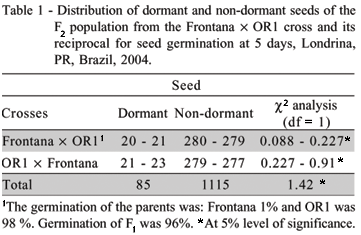Pre-harvest sprouting (PHS) damage leads to occasional massive losses in all wheat producing areas, causing downgrading of grain quality, that severely limits end-use applications and results in substantial financial losses to farmers and food processors. Red grain color is a traditional marker for resistance to sprouting in wheat breeding programs, however red-grained genotype alone does not always guarantee effective resistance. The objective of this work was to find genes for resistance to PHS and investigate its inheritance in Brazilian wheat cultivars. Genetic variation for dormancy was investigated in the parents, F1 and 300 F2 lines derived from the cross Frontana × OR1 and its reciprocal. The germination/dormancy sprouted grains was evaluated on fifty seeds per replication, germinated in paper towel rolls at 20ºC for 5 days. A bimodal distribution for dormancy occurred in the Frontana/OR1 and OR1/Frontana derived F2 populations. The mean ratio of dormant and non-dormant seeds of the cross and its reciprocal was 85:1115, fitting a digenic model of 1:15 (P < 0.05). In fact, all non after-ripened F1 seeds germinated. The F2 distribution indicates that two major genes, here called A,a and B,b, control seed dormancy, which it appears to be recessive to dormancy. Only the homozygous aabb is dormant. As expected, there was no effect of maternal tissues.
Triticum aestivum; QTL; alpha-amylase; digenic model; phenotype



